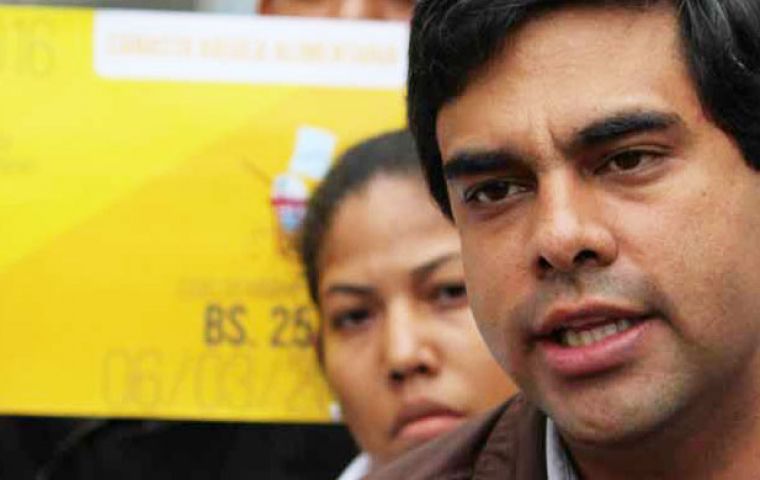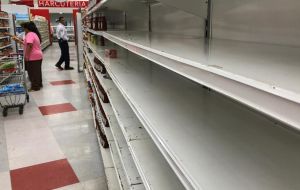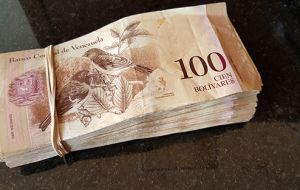MercoPress. South Atlantic News Agency
Hyperinflation hits Venezuela in August; US dollar exchange at 20.000 Bolivar
 “Food is now in hyperinflation” said opposition lawmaker Angel Alvarado, adding that the food sector had seen price rises of 51% in August.
“Food is now in hyperinflation” said opposition lawmaker Angel Alvarado, adding that the food sector had seen price rises of 51% in August.  Millions of Venezuelans are suffering from food and medicine shortages as the oil producer struggles with an economic crisis that spurred months of unrest
Millions of Venezuelans are suffering from food and medicine shortages as the oil producer struggles with an economic crisis that spurred months of unrest  The country's Bolivar currency also weakened past 20,000 per dollar on the widely used black market on Thursday for the first time
The country's Bolivar currency also weakened past 20,000 per dollar on the widely used black market on Thursday for the first time Venezuela's monthly inflation rate jumped to 33.8% in August, with food price rises reaching hyperinflationary levels above 50%, the opposition-controlled National Assembly said on Thursday.
The government stopped releasing the data more than a year ago amid a deep economic crisis, but the National Assembly has published its own figures since January. They are generally in line with private economists' estimates.
The latest month-on-month inflation figure was a jump from the 26% rise in prices reported in July. In the first eight months of 2017, prices rose a cumulative 366.4% percent, according to the elected legislative body.
“Food is now in hyperinflation” said opposition lawmaker Angel Alvarado, adding that the food sector had seen price rises of 51% in August. Economists usually define hyperinflation as occurring when monthly rates exceed 50%.
Millions of Venezuelans are suffering from food and medicine shortages as the oil producer struggles with an economic crisis that spurred months of nationwide unrest earlier this year.
However, the protests have died down in recent weeks, with many in the opposition viewing them as fruitless after populist president Nicolas Maduro's government sidelined the National Assembly and created its own legislative super body.
The country's Bolivar currency also weakened past 20,000 per dollar on the widely used black market on Thursday for the first time. It has lost 95% of its value against the U.S. currency in the past year. The value of $1,000 in local currency purchased when Maduro came to power in April 2013 would now be $1.20.
Maduro blames the crisis on the country's opposition and the United States, whom he says are waging an “economic war” against his government.
Critics blame Maduro's economic policies, including a currency policy that pegs the Bolivar at 10 per dollar at the strongest rate, and the strict price controls, which they say dis-incentivize production.
Opponents also point to a rapidly rising money supply. The country's M2 figure is up 431% in the last year alone. The exponential rise in M2 — the sum of cash, together with checking, savings, and other deposits — means an exponential rise in the amount of currency circulating.




Top Comments
Disclaimer & comment rulesCommenting for this story is now closed.
If you have a Facebook account, become a fan and comment on our Facebook Page!